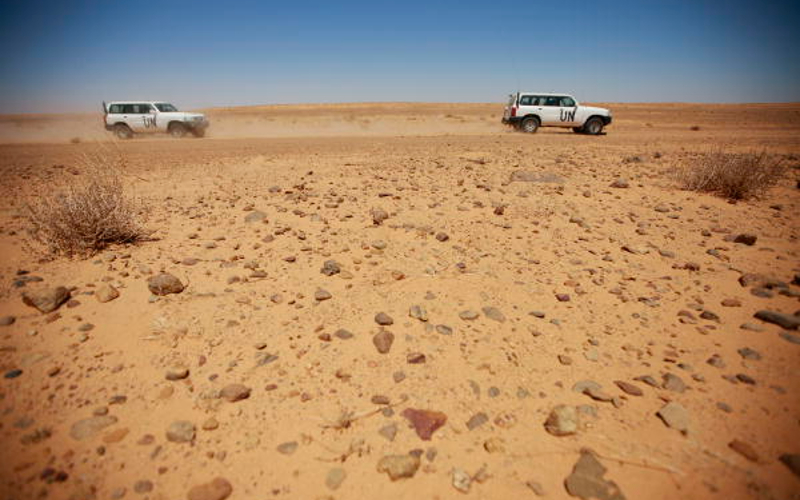Western Sahara, the Biden Administration and Human Rights
The Moroccan government, emboldened by a Trump administration policy shift, is cracking down on Sahrawi activists.

Published by The Lawfare Institute
in Cooperation With

For decades, the Sahrawi people of Western Sahara have mobilized toward the U.N.-backed goal of the right to express their choice of either independence from or integration with the Moroccan state. Despite international support, Sahrawis have been denied this freedom of expression and other human rights by a repressive Moroccan government and military rule, one entrenched since its annexation and claim of sovereignty over Western Sahara in 1975. In December 2020, then-President Trump drastically broke from established U.S. policy, international consensus, and U.N. resolutions to formally recognize Morocco’s control of Western Sahara in a quid pro quo for Morocco to normalize relations with Israel. But in the process, Trump dismissed the human rights of Sahrawis, further marginalizing an oppressed people already struggling to maintain their collective voice, which is unjustifiable.
Thousands upon thousands of Sahrawis have seen their peaceful, lawful expression and protest met with disturbing abuse and extreme crackdowns by Moroccan authorities. Yet despite promising commitments early in his administration to champion human rights as integral to the United States' international role, President Biden has so far left the Sahrawis behind. Meanwhile, Moroccan authorities have carried out increased crackdowns on Sahrawi human rights and dissent under the green light of sustained U.S. recognition for Morocco’s claim to Western Sahara. The administration’s recent public statements on the matter and continued commitments to a strong security relationship with the Moroccan government suggest a refusal to address these abuses and hold Morocco to account.
Implicitly allowing and abetting continued violations of Sahrawi rights and international law diminishes the Biden administration’s credibility when it criticizes abuses committed by other countries. The administration’s stances in defense of human rights have so far conveniently focused on geopolitical adversaries. Morocco, let alone any country, cannot be an exception just because it is a U.S. ally.
President Biden and Secretary of State Antony Blinken must stand up for Sahrawis’ human rights without further hesitation. There are no political considerations that justify not doing so.
Western Sahara, From Annexation to Today
Classified as a non-self-governing territory by the United Nations, Western Sahara and its indigenous population have faced forceful repression by Moroccan authorities since Spain withdrew its colonial rule in the 1970s, despite U.N. General Assembly resolutions passed with broad support in 1979 and 1990 that explicitly called for Sahrawi self-determination and an end to Morocco’s de facto annexation. The United Nations has reaffirmed this position numerous times, including just last year. Since conflict first broke out nearly five decades ago, the armed clashes and then post-cease-fire control by Moroccan forces have displaced tens of thousands of Sahrawis to Algeria. Generations of refugees remain there in run-down camps, waiting for a chance to return to a home where their rights are not repressed.
The Polisario Front, Western Sahara’s self-proclaimed government in exile in Algerian refugee camps, has held the banner of the Sahrawi movement for independence since its establishment in the 1970s and gained control of a small portion of territory ceded by Morocco in a cease-fire brokered by the United Nations in 1991. That cease-fire, and the compromises that immediately preceded it, also guaranteed a free and fair referendum for Sahrawis to choose independence or integration into Moroccan jurisdiction. The kingdom of Morocco explicitly agreed to facilitate the referendum. Yet Moroccan authorities have time and time again failed to follow through due to perpetual contention over who would be eligible to vote. As it stands, Morocco now effectively controls three-fourths of Western Sahara, with the Polisario controlling the remaining one-fourth.
Historically, U.S. policy toward Western Sahara prior to the Trump administration had strayed little from the international consensus and the U.N. plan for a referendum, formally supporting neither Morocco’s nor the Polisario Front’s claim to the territory. When the Moroccan government proposed a plan for regional autonomy for Western Sahara, the Obama administration called the plan “realistic and credible” and claimed it could enable the Sahrawi people to “run their own affairs in dignity.” Otherwise, the United States continued to encourage U.N. negotiations between Moroccan authorities and Sahrawi leaders. But the Trump administration’s decision abandoned any pretense of neutrality over the question of sovereignty.
Human Rights Violations and Lack of Monitoring
The United States remains the only country to formally recognize full Moroccan sovereignty over Western Sahara. But even with the broader international consensus and associated U.N. resolutions, meaningful international human rights monitoring and accountability in the territory are woefully inadequate.
The U.N. peacekeeping mission in Western Sahara, MINURSO, inexplicably lacks a human rights monitoring and reporting mechanism to ensure Sahrawis’ rights, an extreme rarity across U.N. missions. With MINURSO renewed via U.N. Security Council vote each October, the United States—and now the Biden administration—holds significant influence as the mandate’s “penholder,” responsible for drafting and proposing the resolution. With impunity fueled by the absence of U.N. monitoring, Moroccan authorities continue to systemically assault, torture, arbitrarily arrest and detain, forcibly disappear, and silence Sahrawi activists and human rights defenders. And if the Biden administration does not include and push for such a human rights mechanism in its draft before the Security Council, these crackdowns are only likely to worsen.
Abuses against Sahrawis are nothing new. In one case in July 2019, Amnesty International verified Moroccan police’s use of excessive force targeting Sahrawi protesters, in a wave of brutality in which security forces in a tactical police vehicle also trampled and killed a demonstrator. Sahrawi journalist Ibrahim Amrikli was arbitrarily arrested, detained and beaten over two days in May 2020 until he signed a “confession” to false charges. Authorities had long targeted Amrikli, previously detaining him at least three times from 2017 to 2019 for between four days and two months on falsified charges of “committing violent acts.” In a similar case, in July 2020, police in Laayoune arbitrarily detained another journalist, Essabi Yahdih, interrogating him for 10 hours about the editorial line of the publication he founded, threatening him with baseless prosecution; he was not charged.
In recent months, several Sahrawi activists have raised alarm about authorities increasingly arresting and surveilling activists and their families in a renewed crackdown emboldened by Trump’s decision. In all, Amnesty International documented in a July 2021 report the targeting by Moroccan security forces of at least 22 Sahrawi activists, journalists, human rights defenders, and even minors peacefully exercising their rights to free speech and assembly since November 2020 alone. Among them, Amnesty has found at least seven cases of torture and cruel treatment; three house raids; and 11 instances of arbitrary detention, house arrest, assault, harassment, and/or credible allegations of rape by security forces.
Moroccan security forces have imposed a campaign of targeted abuse toward prominent Sahrawi activist Sultana Khaya and her family, held under violently enforced arbitrary house arrest since November 2020 without cause. On May 10, police raided Khaya’s home and arrested three activists who had sneaked in to support Khaya: Babouzid Labhi, Salek Baber and Khaled Boufraya. Authorities proceeded to torture them for hours and then stranded them deep in the desert. And in a horrifying episode two days later, dozens of masked police entered Khaya’s home on the eve of the Muslim celebration of Eid-al-Fitr and tied, beat, and attempted to rape her, while also attacking and raping her sister. There has been no meaningful investigation or accountability for any of this horrific abuse.
The Khayas’ plight is emblematic of the myriad government abuses against Sahrawis. This February, videos circulated on social media showing masked Moroccan policemen forcibly entering the home of another Sahrawi activist, Ghali Bouhla, where they tortured him in front of his mother and sister. Authorities later abducted and jailed him for the lawful acts of peaceful protest and distributing Sahrawi flags. He remains in jail, sentenced through the end of 2022 on bogus drug charges with no investigation into the torture against him.
Security forces also broke into activist Mina Bali’s house and attacked and beat her and her sister Embarka Alina in May 2021 after they waved Western Sahara flags on their rooftop. And when Lahcen Dali, a human rights defender came to check on the family, he was also beaten and then later abducted and dropped off deep in the desert. Mustapha Razouk, a 15-year-old boy, was violently assaulted and arrested by police, along with 14 other minors, after peacefully demonstrating in solidarity with Sultana Khaya. Mustapha was detained and brutally tortured for three days, with authorities pouring boiling melted plastic onto his body, beating him with iron sticks, and suspending him from the ceiling by a rope around his hands.
At least 19 Sahrawi activists currently remain detained following convictions in unfair mass trials over the past decade that carried sentences of 20 years to life imprisonment. These sham trials failed to investigate allegations of torture and coerced confessions. Several detainees have carried out hunger strikes to protest the poor conditions and ill treatment. One of them, Brahim Ismaili—who is serving a life sentence—was transferred to a psychiatric ward without justification in November 2017, just after he had started a second hunger strike. Authorities have further tortured, denied critical medical care and carried out other inhumane treatment of Sahrawi detainees Abdeljalil Laaroussi, Mohamed Haddi, Sidi Abbahah and Bachir Khadda. The latter three have been held in 23-hours-a-day solitary confinement for four years. As of mid-June, Haddi’s family had not heard from him since April 9, when authorities had him call his family to relay their threats to put him in a dungeon-like cell if his family did not stop publicly calling for his release.
The pattern throughout is clear: Moroccan authorities have gone to brutal, extreme lengths to crush dissent and the freedom of expression of Sahrawi activists and critics—no matter how tangential their involvement in the independence movement.
This worsening crackdown received condemnation from U.N. special rapporteur Mary Lawlor in July; meanwhile, the Biden administration has kept silent and maintained its military and diplomatic relations with the Moroccan government as if no crackdown is happening. While authorities continue to arbitrarily imprison and torture Sahrawi dissidents, the Biden administration agreed to increase military cooperation with Morocco’s security forces during a visit by Army Chief of Staff James McConville in August, and awarded Raytheon with a $212 million contract to arm the Moroccan military just weeks before McConville’s visit.
Since the inauguration in January, President Biden has contradicted his stated commitment to human rights in foreign policy by failing to press for and uphold accountability for Moroccan authorities’ flagrant, systematic human rights abuses. In fact, there has been no sign of any greater scrutiny of violations by Moroccan authorities in Western Sahara than the low bar set by the Trump administration.
Meaningful Action Needed by the Biden Administration
The empowering effect of Biden and Blinken’s silence on the abuses in Western Sahara is clear. This silence, with the maintenance of the new status quo set by Trump, serves as a tacit rubber-stamp that grants political cover for Moroccan authorities to continue cracking down on pro-independence Sahrawis with impunity.
As an ally and backer of Morocco’s security state, the United States must stand up for the human rights of Sahrawis, not enable the government to violate them. That means exhausting all avenues to ensure inclusion of human rights monitoring mechanisms in Western Sahara when the U.N. Security Council votes in October to renew MINURSO, and pressing Moroccan authorities to end—and allow independent investigations into—the systematic abuses against Sahrawi activists. Biden must also hold Moroccan authorities accountable for the increasing crackdowns and human rights abuses against Sahrawis, increase efforts to secure appointment of a new U.N. special envoy, and bring an end to the denial of Sahrawis’ right to freedom of expression—including expression in support of independence.
The Moroccan government’s crackdown must also prompt a reevaluation of the U.S. security relationship with Morocco, to hold authorities accountable and ensure Washington is not enabling abuses against Sahrawis. In fact, this is explicitly required by U.S. law. The Leahy Laws and the Foreign Assistance Act both bar the U.S. government from providing security assistance to foreign security forces committing gross violations of human rights and international law. According to the Stockholm International Peace Research Institute, the United States supplies 90 percent of all of Morocco’s arms, with more sales still pending or under negotiation. The Biden administration has a moral and legal obligation to review and report pursuant to these laws if U.S. assistance was used to carry out such abuses, and to suspend arms transfers if there is substantial risk of their use in carrying out further violations.
Eight months into his presidency, Biden still has time to place the United States unwaveringly on the side of the human rights of the Sahrawis, including their right to expression and to advocate for their independence. Systematic, flagrant human rights violations cannot be met by this administration with silence—not in Western Sahara, not anywhere.




.jpeg?sfvrsn=e13b9854_5)
